Technology in the Toolkit: Connecting Kitchens and Creating Community
Wednesday, 04 September 2013 17:10
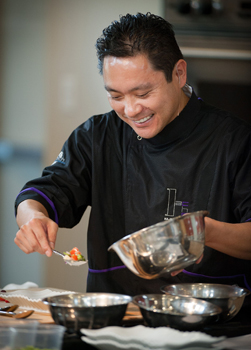 “Gold Medal Classroom” readers who answer a survey (see link below) will receive a special code for a $200 discount on Worlds of Flavor® 2013 registration. Also, all names will be placed into a drawing for one free Worlds of Flavor registration, and three respondents will receive a choice of one of three CIA books.
“Gold Medal Classroom” readers who answer a survey (see link below) will receive a special code for a $200 discount on Worlds of Flavor® 2013 registration. Also, all names will be placed into a drawing for one free Worlds of Flavor registration, and three respondents will receive a choice of one of three CIA books.
By Jan Stuebing Smyth
To be a chef today means to be plugged into local communities, national networks and global conversations. Information technologies are changing foodservice in profound ways in the kitchen, dining room and classroom, particularly since the current generation of Millennial diners grew up with an unprecedented access to 24/7 connectivity.
Any curriculum for aspiring culinarians that does not include a nod to technology in the kitchen—from immersion circulators for new cooking techniques to tablets for access to their curriculum—is incomplete. A single YouTube video, real-time webcast or even an Instagram photo can transport a chef or student to a restaurant or village kitchen thousands of miles away and alter his or her culinary aspirations in an instant, turning the world into a classroom.
Culinary philosophies are being incubated in highly personal, globally conscious ways that could only happen in this hyper-connected age of information and social-networking technologies. Chefs in Spain look to the kitchens of Japan as part of re-imagining their regional traditions. Chefs from New York to California exchange ideas over the web as they re-invent Moroccan and Southeast Asian flavors. Chefs from Lima and Lisbon, Sydney and Shanghai gather at international conferences—like MAD in Copenhagen, Mesamérica in Mexico City and Worlds of Flavor in Napa Valley—to forge new professional bonds that expand the creative space in which they work.
Whereas previously, influential food critics at city and national publications controlled the destiny of ambitious chefs and restaurants, chefs today can build their own communities of support. A four-star review from The New York Times or a top Michelin rating still yields considerable weight in a restaurant’s ability to attract and retain customers, but they are no longer the only game in town. Crowd-sourced reviews from Yelp, Zagat and others, along with social media juggernauts like Twitter and Facebook and the commenting sections of blogs, have undercut the established critics who used to have the power to make or break a restaurant. Not having to court the favor of high-profile critics means not having to skew one’s cooking or dining concepts to the expectations of a small handful of gatekeepers.

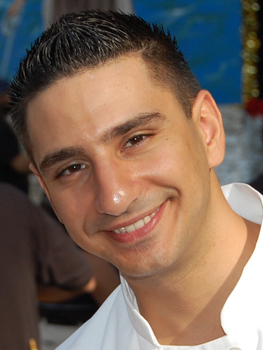 Marco Chirico, at only 25, is already moving a legacy into the next generation via his father’s restaurants—one operating for three decades and one a few years young—in Brooklyn.
Marco Chirico, at only 25, is already moving a legacy into the next generation via his father’s restaurants—one operating for three decades and one a few years young—in Brooklyn.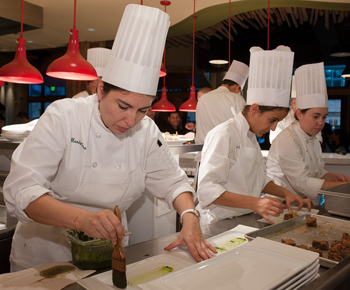 As students go to college this fall, The Culinary Institute of America (CIA) is offering them exciting new education options. These new concentrations—in beverage management, farm-to-table cooking and Latin cuisines—give students the chance to focus their studies on a particular area of interest in the food world.
As students go to college this fall, The Culinary Institute of America (CIA) is offering them exciting new education options. These new concentrations—in beverage management, farm-to-table cooking and Latin cuisines—give students the chance to focus their studies on a particular area of interest in the food world. Following the recommendations identified by the acronym, WARM, you can inspire students to reach for ultimate success from the moment they return to or begin their training.
Following the recommendations identified by the acronym, WARM, you can inspire students to reach for ultimate success from the moment they return to or begin their training. Students in teams don’t necessarily have to like each other, says Chef Weiner. They won’t have the luxury of choosing their teammates in the real world, after all. But they do have to learn to work together to execute a successful meal. Here are proven tips to teach them how.
Students in teams don’t necessarily have to like each other, says Chef Weiner. They won’t have the luxury of choosing their teammates in the real world, after all. But they do have to learn to work together to execute a successful meal. Here are proven tips to teach them how.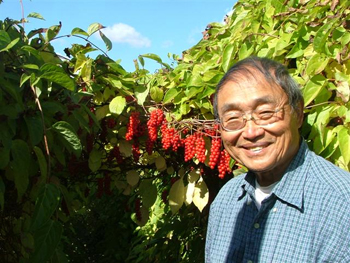 Dr. Tso-Cheng Chang was a pioneer of “no pesticides or herbicides” farming in the United States. His farm, which grows vegetables for his award-winning restaurant in Amherst, Mass., not only is one of the largest bean-spout producers in the nation, it also grows schizandra berries—which might be the ginseng of this decade.
Dr. Tso-Cheng Chang was a pioneer of “no pesticides or herbicides” farming in the United States. His farm, which grows vegetables for his award-winning restaurant in Amherst, Mass., not only is one of the largest bean-spout producers in the nation, it also grows schizandra berries—which might be the ginseng of this decade. OMNI-TV host and associate producer Lucy Zilio visited the Culinary Arts Centre at Centennial College in Toronto recently to take in the sights and aromas of a live kitchen lesson. In a video (110 seconds) on the program’s website, Zilio speaks with chef and professor Samuel Glass about the special focus Centennial’s program places on international cuisine. Visit
OMNI-TV host and associate producer Lucy Zilio visited the Culinary Arts Centre at Centennial College in Toronto recently to take in the sights and aromas of a live kitchen lesson. In a video (110 seconds) on the program’s website, Zilio speaks with chef and professor Samuel Glass about the special focus Centennial’s program places on international cuisine. Visit 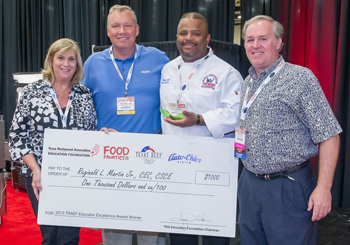 Chef Reginald Martin, culinary-arts instructor at Westside High School in Houston, Texas, is the recipient of the Texas Restaurant Association Education Foundation’s 2013 Educator Excellence Award. Martin has been leading Westside’s program since 2008 and has more than 100 students enrolled in the program.
Chef Reginald Martin, culinary-arts instructor at Westside High School in Houston, Texas, is the recipient of the Texas Restaurant Association Education Foundation’s 2013 Educator Excellence Award. Martin has been leading Westside’s program since 2008 and has more than 100 students enrolled in the program.